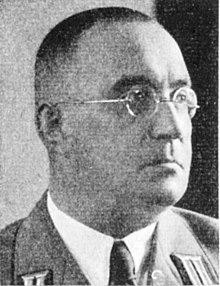Emil Breitenstein
Emil Breitenstein (born August 31, 1899 in Rosenheim , † November 18, 1971 in Bad Tölz ) was a German politician ( NSDAP ) and SA leader.
Life and activity
Youth and Life 1899 to 1933
Breitenstein was born in 1899 as the son of a foreman. After attending elementary school and secondary school, he completed a commercial apprenticeship. From 1916 he took part in the First World War. He experienced the end of the war in a hospital in Brussels .
After his return to Germany, Breitenstein was initially unemployed. In 1920 he first found a job as an accountant in Erding and was later employed as an authorized signatory .
At the beginning of May 1920, Breitenstein joined the NSDAP, which he rejoined on September 1, 1928 - after being temporarily banned. The reason for joining the party was a speech by Hitler that he heard in 1920 and in which he found a great deal of knowledge from war experiences. Politically, Breitenstein described himself as a "German and a socialist" . When he turned to National Socialism , he was looking for a system that “could meet the demands of the workers” because he was “not a hurray patriot but one with socialist principles” . He later emphasized that he had rejected "racial hatred and noise" .
In 1928, Breitenstein took part in the establishment of the NSDAP local group in Erding, which he took over in 1930. In the same year he was also entrusted with the office of district manager. In the armed arm of the Nazi movement, the Sturmabteilung (SA), to which he belonged from 1920 to 1923 and again from 1930, he reached the rank of Obersturmbannführer in 1938.
Period of National Socialism (1933 to 1945)
From March 30, 1933 to February 28, 1945, Breitenstein served as honorary mayor of Erding. On December 10, 1942, Breitenstein joined the National Socialist Reichstag as a replacement for the late MP Karl Wenzl , to which he belonged until the end of the Nazi regime in spring 1945 as a representative of constituency 24 (Upper Bavaria-Swabia).
In the last phase of the war, Breitenstein took on the duties of Volkssturmführer in Erding from November 1944 to May 1945 .
Arrest and Arbitration Trial
On May 2, 1945, he was discovered and arrested by the US Army in a hunting lodge outside of Erding. Since he was initially suspected of having been involved in the shooting of American airmen , he was initially imprisoned in the Dachau internment camp . In August 1947, after the suspicions had proven to be unfounded, he was handed over to the so-called automatic arrest .
On September 4, 1948, the proceedings against Breitenstein began before the Dachau ruling chamber . The public prosecutor pleaded that he should be classified as the main culprit, pointing out that Breitenstein was a "very feared and a very radical advocate of the Third Reich ". In particular, he was charged with several cases in which he pleaded for the detention of dissidents . On September 14, 1948, he was sentenced to a three-year labor camp, which was considered served due to his time in the internment camp. Furthermore, his civil rights were denied for ten years and his property confiscated. Unlike many other former Nazi functionaries, he did not deny his earlier convictions, but instead confessed to them: "It is not for me today to throw a stone at things that were sacred to me until then." In the appeal process, Breitenstein was able to get one Present a series of exonerating certificates in which he was attested to having “racial tolerance” , “sincere socialist attitude” and “helpfulness” . Many of them must have been Persilscheine , but some might have been more weighty: The official Elsässer, from 1932 to 1946 district judge in Erding, who according to National Socialist standards was considered a first-degree hybrid, assured that he owed Breitenstein to his Profession should have continued to practice. In the appeal hearing, Breitenstein was classified as a minor and imposed on him a fine and two years of restrictions in his choice of profession.
According to research by Barbara Feits, Breitenstein was a staunch supporter of the Nazi ideology, but not a fanatic or activist, but rather a vicarious agent who believes in authority and who has done what he is asked to do without question.
Individual evidence
- ↑ a b Barbara Feit: Kreisleiter , p. 272f.
- ↑ Barbara Feit: Kreisleiter , p. 274.
- ↑ Barbara Feit: Kreisleiter , p. 275f.
- ↑ Barbara Feit: Kreisleiter , p. 273.
literature
- E. Kienast (Ed.): The Greater German Reichstag 1938, IV. Electoral period, R. v. Decker's Verlag, G. Schenck, Berlin, June 1943 edition.
- Barbara Feit: The district leaders of the NSDAP - after 1945. In: Martin Broszat , Klaus-Dietmar Henke , Hans Woller (Hrsg.): From Stalingrad to currency reform. On the social history of upheaval in Germany. Oldenbourg, Munich 1988, ISBN 3-486-54131-5 , pp. 213-300.
- Joachim Lilla , Martin Döring, Andreas Schulz: extras in uniform: the members of the Reichstag 1933–1945. A biographical manual. Including the Volkish and National Socialist members of the Reichstag from May 1924 . Droste, Düsseldorf 2004, ISBN 3-7700-5254-4 .
- Erich Stockhorst: 5000 people. Who was what in the 3rd Reich . Arndt, Kiel 2000, ISBN 3-88741-116-1 (unchanged reprint of the first edition from 1967).
| personal data | |
|---|---|
| SURNAME | Breitenstein, Emil |
| BRIEF DESCRIPTION | German politician (NSDAP), MdR and SA leader |
| DATE OF BIRTH | August 31, 1899 |
| PLACE OF BIRTH | Rosenheim |
| DATE OF DEATH | 18th November 1971 |
| Place of death | Bad Toelz , Upper Bavaria |
